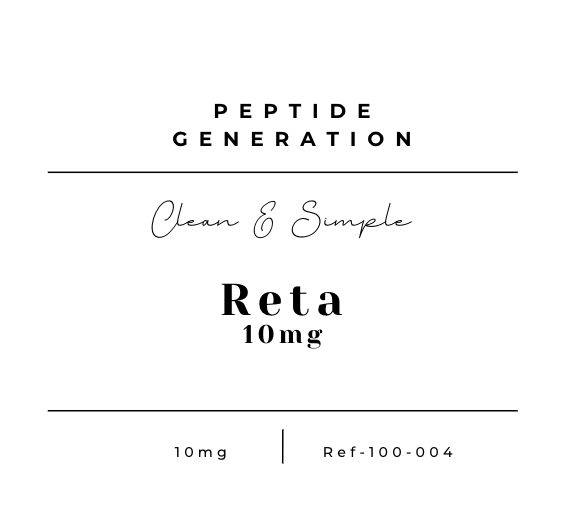 Image 1 of 2
Image 1 of 2

 Image 2 of 2
Image 2 of 2



Reta 10mg
🔬 What Is Retatrutide?
Retatrutide (also called LY3437943) is a next-generation triple hormone receptor agonist developed by Eli Lilly.
It activates GLP-1, GIP, and glucagon receptors simultaneously.
It is being studied as a once-weekly injectable therapy for obesity, type 2 diabetes, and related metabolic conditions.
As of 2025, it is still investigational (not FDA-approved).
⚙️ How It Works
GLP-1 receptor agonism → reduces appetite, slows gastric emptying, improves insulin secretion.
GIP receptor agonism → enhances insulin response, may reduce GI side effects of GLP-1s.
Glucagon receptor agonism → increases energy expenditure and reduces liver fat.
Together, this triple action targets both caloric intake (less hunger) and energy expenditure (more fat burning).
📊 Clinical Trial Results
Phase 2 (48 weeks, obesity without diabetes):
Participants lost:
–7.2% at 1 mg/week
–22–24% at 8–12 mg/week
Some individuals lost over 25% of body weight, which is greater than results seen with semaglutide (Wegovy) or tirzepatide (Zepbound).
Type 2 Diabetes trials:
Showed robust glucose lowering and significant weight loss.
Early data suggests it may help reduce liver fat (NAFLD/NASH) as well.
⚠️ Side Effects
Mostly gastrointestinal (similar to semaglutide/tirzepatide):
Nausea, vomiting, diarrhea, constipation
Other possible issues: decreased appetite, fatigue, mild dizziness
Serious risks (still under study): gallbladder disease, pancreatitis, rare GI obstruction
Contraindications will likely mirror other incretin drugs (e.g., personal/family history of medullary thyroid carcinoma or MEN2).
✅ Key Takeaways
Retatrutide = triple agonist (GLP-1 + GIP + glucagon), investigational for obesity and diabetes.
Efficacy: Early studies show up to 24% weight loss in 48 weeks, the most potent seen so far in this drug class.
Dosing: Weekly injections, titrated gradually (1 mg → 12 mg).
Status: Not FDA-approved yet (likely timeline ~2026–2027 if trials remain positive).
Potential: May outperform both semaglutide and tirzepatide in weight loss and metabolic improvement.
🔬 What Is Retatrutide?
Retatrutide (also called LY3437943) is a next-generation triple hormone receptor agonist developed by Eli Lilly.
It activates GLP-1, GIP, and glucagon receptors simultaneously.
It is being studied as a once-weekly injectable therapy for obesity, type 2 diabetes, and related metabolic conditions.
As of 2025, it is still investigational (not FDA-approved).
⚙️ How It Works
GLP-1 receptor agonism → reduces appetite, slows gastric emptying, improves insulin secretion.
GIP receptor agonism → enhances insulin response, may reduce GI side effects of GLP-1s.
Glucagon receptor agonism → increases energy expenditure and reduces liver fat.
Together, this triple action targets both caloric intake (less hunger) and energy expenditure (more fat burning).
📊 Clinical Trial Results
Phase 2 (48 weeks, obesity without diabetes):
Participants lost:
–7.2% at 1 mg/week
–22–24% at 8–12 mg/week
Some individuals lost over 25% of body weight, which is greater than results seen with semaglutide (Wegovy) or tirzepatide (Zepbound).
Type 2 Diabetes trials:
Showed robust glucose lowering and significant weight loss.
Early data suggests it may help reduce liver fat (NAFLD/NASH) as well.
⚠️ Side Effects
Mostly gastrointestinal (similar to semaglutide/tirzepatide):
Nausea, vomiting, diarrhea, constipation
Other possible issues: decreased appetite, fatigue, mild dizziness
Serious risks (still under study): gallbladder disease, pancreatitis, rare GI obstruction
Contraindications will likely mirror other incretin drugs (e.g., personal/family history of medullary thyroid carcinoma or MEN2).
✅ Key Takeaways
Retatrutide = triple agonist (GLP-1 + GIP + glucagon), investigational for obesity and diabetes.
Efficacy: Early studies show up to 24% weight loss in 48 weeks, the most potent seen so far in this drug class.
Dosing: Weekly injections, titrated gradually (1 mg → 12 mg).
Status: Not FDA-approved yet (likely timeline ~2026–2027 if trials remain positive).
Potential: May outperform both semaglutide and tirzepatide in weight loss and metabolic improvement.

